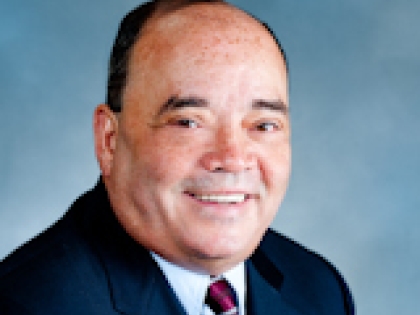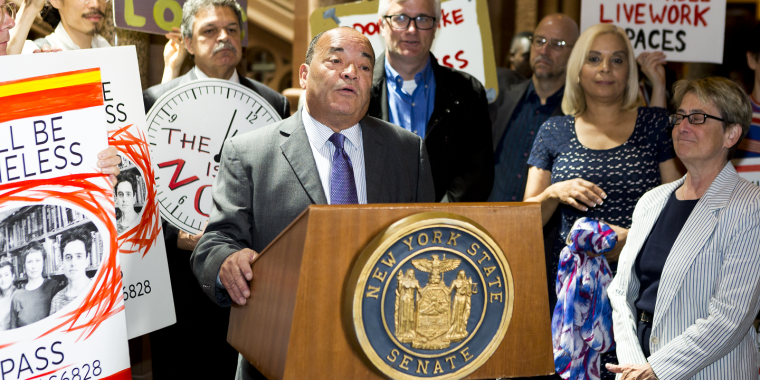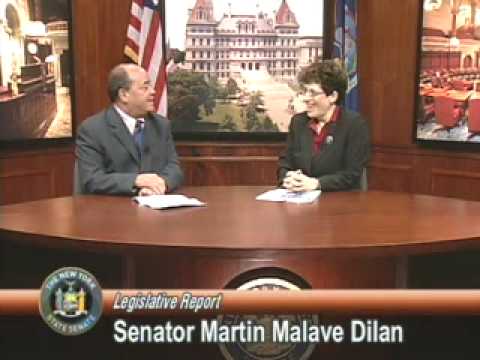
Senators Dilan, Kavanagh, and Democratic Conference Colleagues Join Live/Work Tenants in Call for Passage of Loft Law Cleanup Before Close of Session
Graham S. Parker
June 12, 2018

(Albany, N.Y.)—State Senators Martin Malavé Dilan and Brian Kavanagh today joined Senate Democratic Conference colleagues and tenant advocates of the 2018 Loft Law cleanup bill to demand Senate Republicans pass the measure before the scheduled close of session on June 20.
If the bill fails to pass this session and become law, thousands of tenants and families will lose the right to stay. The loss will compound the affordable housing crisis in New York City. Businesses will shutter as workspaces disappear. The cultural impact to communities is immeasurable.
“Many people will be homeless and jobless by the end of June if this does not pass. Both Republicans and Democrats can agree that keeping safe, affordable homes and reliable jobs in New York City is a top priority. They have come together in support of the Loft Law multiple times. There is no reason not to do it again. We are counting on the Senate to help keep us in our homes so we can continue to live, work and contribute,” said Ximena Garnica, Brooklyn Loft Tenant.
The Loft Law Clean Up of 2018 (S. 6828A) would strike exclusionary language currently used to deny loft tenants legal status. It seeks to reopen the application process and eligibility periods so lofts can comply with fire and building standards. After the Loft Law was made permanent in 2010, the last Republican-sponsored cleanup bill passed the State Senate (56 to 7), and became law in 2013. The Rent Act of 2015 extended the application deadline until June 15, 2017. Senate Democratic sponsors and supporters of the 2018 cleanup bill have formally asked Majority Leader Flanagan to bring it to floor in the spirit of past bipartisan support, and the consequences inaction has for live/work tenants.
“The Loft Law has been an end-of-session political football for as long as I remember. Last minute amendments weaken it. Sunsets guarantee that every few years tenants anxiously await the fate of their homes. Legislative deadlines that require loft applicants to register their units serve as save the dates for the bad actors waiting to force them out. Both conferences have had clean up bills signed to law. We must do it again as we work toward a solution for these tenants. It’s important that we remember that we are talking about New Yorker’s homes,” said Senator Dilan.
“More than three decades ago, the legislature recognized loft tenants’ precarious position and the important role these live/work spaces play in our communities, and put protections in place to defend loft tenants’ rights. The 2018 Loft Law cleanup bill will help us continue to protect New Yorkers’ homes and their livelihoods,” State Senator Brian Kavanagh said. “This bill has passed the Assembly for two years in a row. Today, I’m proud to join Senator Dilan and loft tenants to shine a light on their situation, and urge our Republican colleagues in the Senate to follow the Assembly’s lead and bring this critical bill to a vote before we adjourn next week.”
“Many of New York's loft tenants continue to remain in the shadows, living in potentially dangerous conditions because the law is riddled with loopholes. The Loft Law Clean Up bill will ensure that lofts are legal and safe for its inhabitants. Their preservation will not only act as one of the last stalwarts against gentrification, but also contribute to the ever-diminishing affordable housing stock in New York City,” said State Senator Brad Hoylman.
Enacted in 1982, the Loft Law established tenant protections to non-residential buildings where units were converted to residential use. These buildings lacked compliance with laws governing zoning, housing maintenance, health, safety and fire protection standards applicable to residential occupants. Tenants were also subject to arbitrary evictions and unfair rent increases.
related legislation
Share this Article or Press Release
Newsroom
Go to Newsroom'Rodeo' Rich Washington
June 1, 2010
